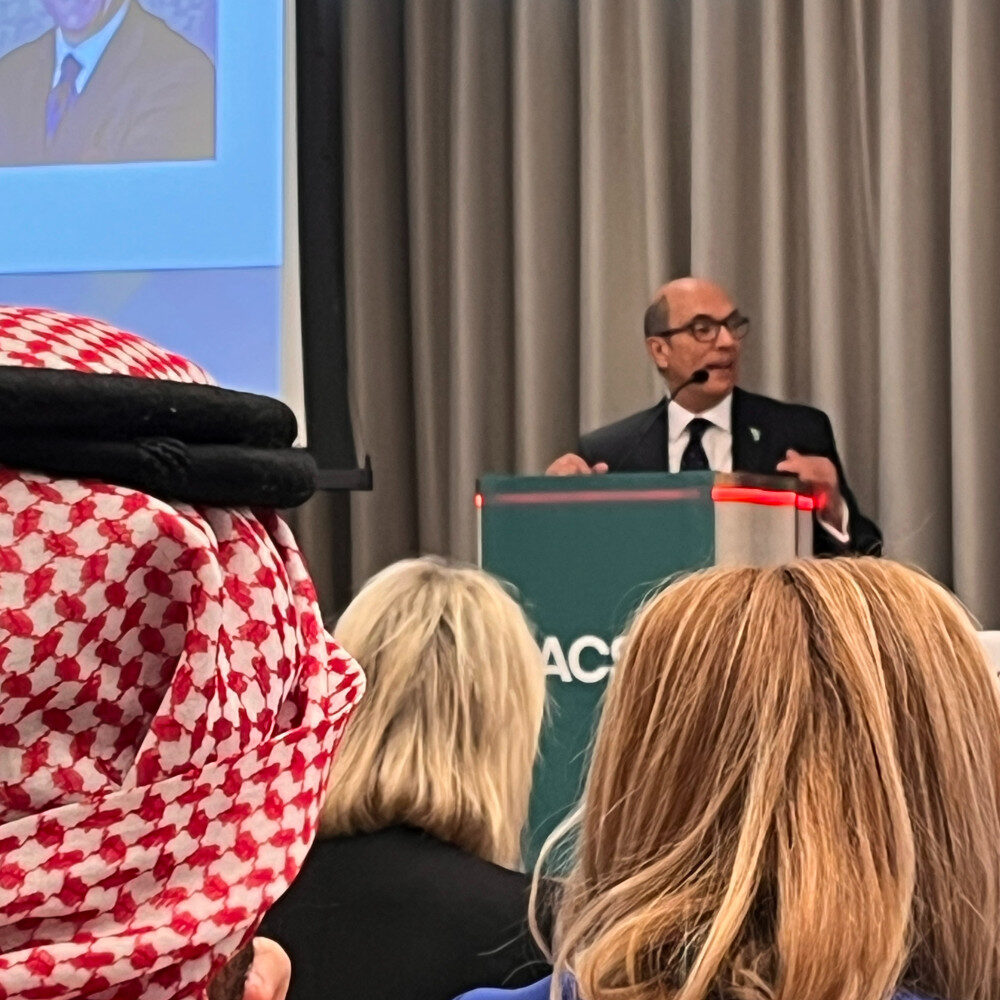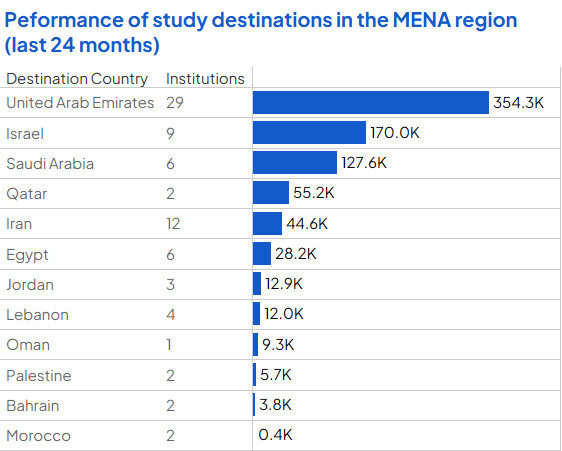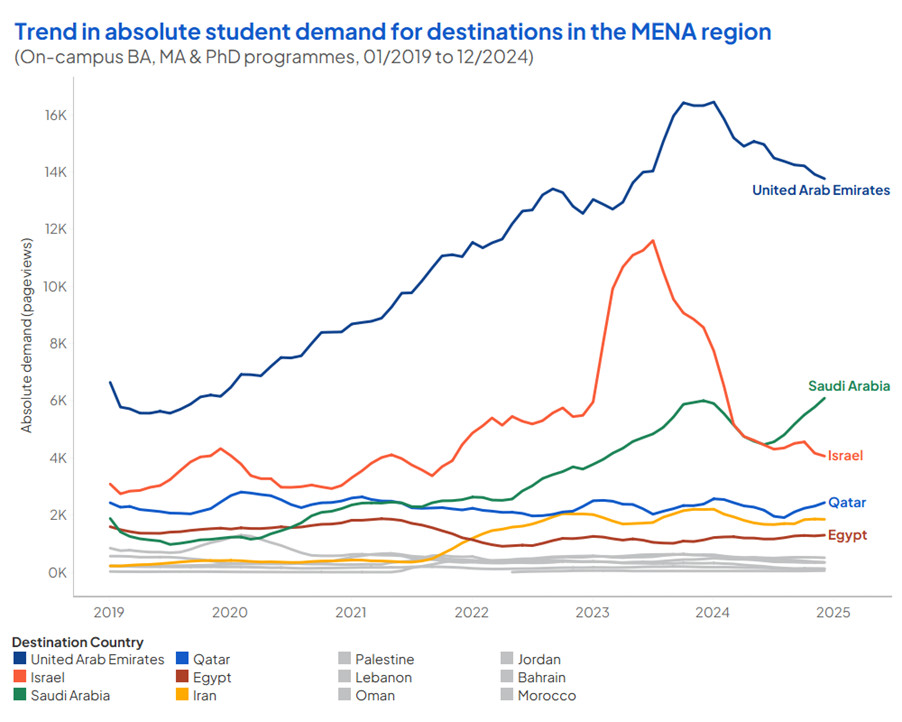Exploring international education in the MENA region: Growth markets and regional trends
 Dr. Mathias Falkenstein
Dr. Mathias Falkenstein
 Karl Baldacchino
Karl Baldacchino

The MENA region is fast becoming a global hub for higher education, with Dubai leading the charge through ambitious investments and innovative strategies. From January 14-16, 2025, Director of Higher Education Development for the Studyportals` @Analytics and Consulting Team, Dr. Mathias Falkenstein, attended the following events in Dubai:
- The AACSBMiddle East and North Africa Conference;
- The Times Higher EducationBusiness School Showcase at the University of Dubai;
- A report launch event by British Councilat Middlesex University Dubai.
These events provided invaluable insights into the rapidly evolving higher education landscape in the region and highlighted significant opportunities for growth and collaboration.
High-potential growth market in MENA
In meetings with key stakeholders, including Dr. Nitesh Sughnani from Dubai’s Knowledge & Human Development Authority (KHDA), it was learnt that Dubai holds ambitious plans to establish over 100 new universities by 2050, backed by an investment of $55 billion. In relation to this the upcoming National University of Dubai will serve as a flagship institution in this expansive project, during which KHDA will continue to oversee the accreditation of all private higher education institutions in Dubai, explaining that a record number of international applications for branch campuses was set this year.
The main goal for Dubai is to position itself as the leading hub for higher education in the region, competing with other prominent players in the region like Saudi Arabia, Egypt, and Qatar. To support this vision, the Higher Education Sector is seeking collaborations in areas such as prospective student data analysis, market and competitor analysis, programme portfolio development, and graduate retention strategies.
Highlights from the Times Higher Education, AACSB, and British Council events
During the Times Higher Education Business School Showcase, featured sessions focused on innovating business education, navigating transnational education challenges, and aligning educational offerings with stakeholder needs. The event was attended by over 100 delegates from higher education, business as well as society and chaired by THE Director of Business School Solutions & Partnerships Benjamin Stevenin and hosted at the University of Dubai by Dean Washika Haak-Saheem. During the half day event, the different panels emphasised the importance of adapting to regional strengths and ensuring the relevance of the regional business curricula in the MENA higher education sector.
The AACSB MENA Conference was opened by AACSB’s CEO and President Lily Bi where over 150 delegates representing 25 countries across 4 continents gathered for 2 days to discuss a wide range of issues important for business schools, business, and society. Many interactions highlighted a strong interest in using data to shape marketing and recruitment strategies, programme development, and measuring institutional success through metrics like graduate stay rates.
ACCSB’s Chair of Board of Directors and Conference Chair Sheriff Kamel says:
The purpose is to tackle the critical challenges and capitalize on the evolving opportunities facing business education while fostering collaborations that can drive innovation and realize impact throughout the region.

The British Council launched a comprehensive report titled “”Examining the Sustainability of Transnational Education (TNE) in Egypt, Qatar, and the United Arab Emirates (UAE)“. This report presents case studies and introduces a sustainability framework to support enduring partnerships between UK higher education institutions and their MENA counterparts. Key findings indicate a significant increase in international student enrolment from regions such as India, Pakistan, and Sub-Saharan Africa, alongside robust development plans from both foreign and domestic universities in Dubai.
The MENA region according to Studyportals data
Based on the last 24 months of Studyportals data, there are 78 institutions across 12 destinations in the region that offer either a Bachelor, Master, or PhD English-taught programme.
The demand (i.e. pageviews) generated by prospective students is strongly focused on the UAE, followed by Israel, Saudi Arabia, Qatar, and Iran.

A deeper dive into the data reveals varying demand trends across MENA-based education destinations. While the UAE has consistently remained the top choice for international students over the past five years, demand for Israel saw a gradual increase, reaching a significant peak by mid-2023. However, this surge was short-lived, with demand declining rapidly thereafter, represented as 57% drop in the last months (Jan. 2024 to Dec. 2024) compared to the previous 12 months (Jan. 2023 to Dec. 2023). This downturn may be associated with heightened regional tensions, including the ongoing humanitarian challenges in Gaza, which influence student and institutional perceptions.

Given the steep drop for Israel, the year-over-year change in demand by recruitment market would expectedly show large declines from Brazil (-90.5%), India (-27.8%), and Türkiye (-43.6%). If Israel were to be removed from the regional context, then we simply see largely modest declines in demand, alongside promising growth from both Nepalese and US students.
Looking Ahead
Our participation in these events has solidified our commitment to expanding our footprint in the MENA region. By leveraging our expertise in data analytics and strategic consulting, we aim to support Dubai’s vision of becoming a premier destination for higher education. These engagements not only reinforce our dedication to the region but also highlight the critical role we can play in shaping its educational future.
A central takeaway from our visit is the recognition that conducting business in the MENA region is predominantly relational rather than transactional. This means that a cultural nuance often underscores the importance of building strong, long-term partnerships, with our engagements in the region confirming that the MENA represents a high-potential growth market.
As this region continues to evolve, Studyportals is uniquely positioned to provide actionable insights and foster collaboration. We invite higher education leaders and institutions to partner with us in driving innovation and shaping a thriving, inclusive future for education in this dynamic region.


